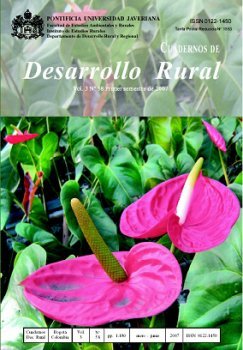Abstract
El presente trabajo es el resultado de un estudio realizado en la zona norte de la Planicie delRío Motatán (Costas del Lago de Maracaibo en Venezuela), sobre los sistemas de producciónde dos comunidades campesinas (Tomoporo de Tierra y San Roque). Fue desarrollado desdeuna perspectiva antropológica y sociológica (antropología del desarrollo), que pretende darcuenta de las características generales de los sistemas de cultivos, sistemas de crianza,organización para el trabajo y relaciones entre productores e intermediarios. Para ello, seaplicó una encuesta y varias entrevistas abiertas a los cincuenta (50) productores de las doscomunidades, en una estrategia que permitió conjugar análisis cuantitativos y cualitativos. Se concluye que el sistema de producción predominante se erige sobre cultivos permanentes,crianza de ganado vacuno, organización para el trabajo con divisiones tareas por género yla subcontratación de mano de obra familiar.Cuadernos de Desarrollo Ruralis registered under a Creative Commons Attribution 4.0 International Public License. Thus, this work may be reproduced, distributed, and publicly shared in digital format, as long as the names of the authors and Pontificia Universidad Javeriana are acknowledged. Others are allowed to quote, adapt, transform, auto-archive, republish, and create based on this material, for any purpose (even commercial ones), provided the authorship is duly acknowledged, a link to the original work is provided, and it is specified if changes have been made. Pontificia Universidad Javeriana does not hold the rights of published works and the authors are solely responsible for the contents of their works; they keep the moral, intellectual, privacy, and publicity rights.
Approving the intervention of the work (review, copy-editing, translation, layout) and the following outreach, are granted through an use license and not through an assignment of rights. This means the journal and Pontificia Universidad Javeriana cannot be held responsible for any ethical malpractice by the authors. As a consequence of the protection granted by the use license, the journal is not required to publish recantations or modify information already published, unless the errata stems from the editorial management process. Publishing contents in this journal does not generate royalties for contributors.


